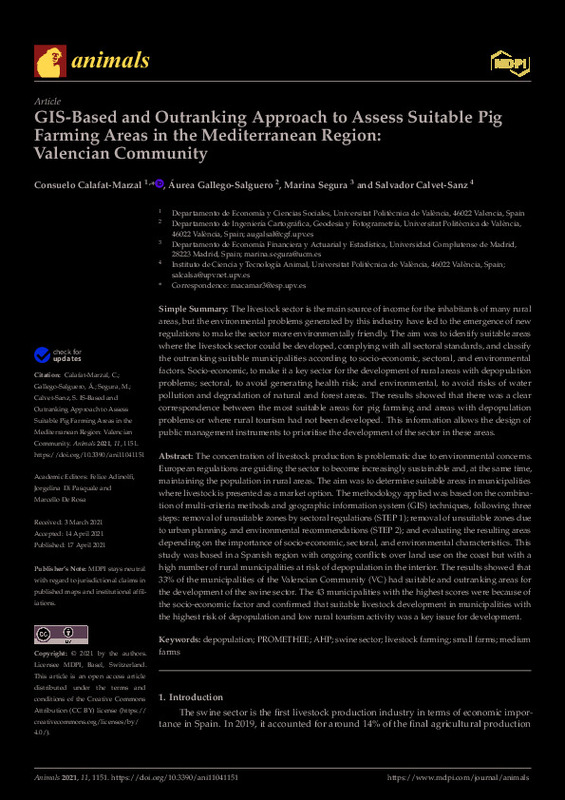JavaScript is disabled for your browser. Some features of this site may not work without it.
Buscar en RiuNet
Listar
Mi cuenta
Estadísticas
Ayuda RiuNet
Admin. UPV
GIS-Based and Outranking Approach to Assess Suitable Pig Farming Areas in the Mediterranean Region: Valencian Community
Mostrar el registro sencillo del ítem
Ficheros en el ítem
| dc.contributor.author | Calafat Marzal, Consuelo
|
es_ES |
| dc.contributor.author | Gallego Salguero, Aurea Cecilia
|
es_ES |
| dc.contributor.author | Segura, Marina
|
es_ES |
| dc.contributor.author | Calvet, S.
|
es_ES |
| dc.date.accessioned | 2022-10-05T18:03:08Z | |
| dc.date.available | 2022-10-05T18:03:08Z | |
| dc.date.issued | 2021-04 | es_ES |
| dc.identifier.uri | http://hdl.handle.net/10251/187086 | |
| dc.description.abstract | [EN] Simple Summary The livestock sector is the main source of income for the inhabitants of many rural areas, but the environmental problems generated by this industry have led to the emergence of new regulations to make the sector more environmentally friendly. The aim was to identify suitable areas where the livestock sector could be developed, complying with all sectoral standards, and classify the outranking suitable municipalities according to socio-economic, sectoral, and environmental factors. Socio-economic, to make it a key sector for the development of rural areas with depopulation problems; sectoral, to avoid generating health risk; and environmental, to avoid risks of water pollution and degradation of natural and forest areas. The results showed that there was a clear correspondence between the most suitable areas for pig farming and areas with depopulation problems or where rural tourism had not been developed. This information allows the design of public management instruments to prioritise the development of the sector in these areas. The concentration of livestock production is problematic due to environmental concerns. European regulations are guiding the sector to become increasingly sustainable and, at the same time, maintaining the population in rural areas. The aim was to determine suitable areas in municipalities where livestock is presented as a market option. The methodology applied was based on the combination of multi-criteria methods and geographic information system (GIS) techniques, following three steps: removal of unsuitable zones by sectoral regulations (STEP 1); removal of unsuitable zones due to urban planning, and environmental recommendations (STEP 2); and evaluating the resulting areas depending on the importance of socio-economic, sectoral, and environmental characteristics. This study was based in a Spanish region with ongoing conflicts over land use on the coast but with a high number of rural municipalities at risk of depopulation in the interior. The results showed that 33% of the municipalities of the Valencian Community (VC) had suitable and outranking areas for the development of the swine sector. The 43 municipalities with the highest scores were because of the socio-economic factor and confirmed that suitable livestock development in municipalities with the highest risk of depopulation and low rural tourism activity was a key issue for development. | es_ES |
| dc.language | Inglés | es_ES |
| dc.publisher | MDPI AG | es_ES |
| dc.relation.ispartof | Animals | es_ES |
| dc.rights | Reconocimiento (by) | es_ES |
| dc.subject | Depopulation | es_ES |
| dc.subject | PROMETHEE | es_ES |
| dc.subject | AHP | es_ES |
| dc.subject | Swine sector | es_ES |
| dc.subject | Livestock farming | es_ES |
| dc.subject | Small farms | es_ES |
| dc.subject | Medium farms | es_ES |
| dc.subject.classification | ECONOMIA, SOCIOLOGIA Y POLITICA AGRARIA | es_ES |
| dc.subject.classification | INGENIERIA CARTOGRAFICA, GEODESIA Y FOTOGRAMETRIA | es_ES |
| dc.subject.classification | ESTADISTICA E INVESTIGACION OPERATIVA | es_ES |
| dc.subject.classification | PRODUCCION ANIMAL | es_ES |
| dc.title | GIS-Based and Outranking Approach to Assess Suitable Pig Farming Areas in the Mediterranean Region: Valencian Community | es_ES |
| dc.type | Artículo | es_ES |
| dc.identifier.doi | 10.3390/ani11041151 | es_ES |
| dc.relation.projectID | info:eu-repo/grantAgreement/GENERALITAT VALENCIANA//S8653000//DISMINUCION DEL IMPACTO AMBIENTAL DE LA GANADERIA EN LA COMUNITAT VALENCIANA/ | es_ES |
| dc.rights.accessRights | Abierto | es_ES |
| dc.contributor.affiliation | Universitat Politècnica de València. Departamento de Economía y Ciencias Sociales - Departament d'Economia i Ciències Socials | es_ES |
| dc.contributor.affiliation | Universitat Politècnica de València. Departamento de Ciencia Animal - Departament de Ciència Animal | es_ES |
| dc.contributor.affiliation | Universitat Politècnica de València. Departamento de Ingeniería Cartográfica Geodesia y Fotogrametría - Departament d'Enginyeria Cartogràfica, Geodèsia i Fotogrametria | es_ES |
| dc.contributor.affiliation | Universitat Politècnica de València. Departamento de Estadística e Investigación Operativa Aplicadas y Calidad - Departament d'Estadística i Investigació Operativa Aplicades i Qualitat | es_ES |
| dc.description.bibliographicCitation | Calafat Marzal, C.; Gallego Salguero, AC.; Segura, M.; Calvet, S. (2021). GIS-Based and Outranking Approach to Assess Suitable Pig Farming Areas in the Mediterranean Region: Valencian Community. Animals. 11(4):1-25. https://doi.org/10.3390/ani11041151 | es_ES |
| dc.description.accrualMethod | S | es_ES |
| dc.relation.publisherversion | https://doi.org/10.3390/ani11041151 | es_ES |
| dc.description.upvformatpinicio | 1 | es_ES |
| dc.description.upvformatpfin | 25 | es_ES |
| dc.type.version | info:eu-repo/semantics/publishedVersion | es_ES |
| dc.description.volume | 11 | es_ES |
| dc.description.issue | 4 | es_ES |
| dc.identifier.eissn | 2076-2615 | es_ES |
| dc.identifier.pmid | 33920559 | es_ES |
| dc.identifier.pmcid | PMC8073630 | es_ES |
| dc.relation.pasarela | S\435800 | es_ES |
| dc.contributor.funder | GENERALITAT VALENCIANA | es_ES |
| dc.contributor.funder | Universitat Politècnica de València | es_ES |
| dc.subject.ods | 13.- Tomar medidas urgentes para combatir el cambio climático y sus efectos | es_ES |
| dc.subject.ods | 17.- Fortalecer los medios de ejecución y reavivar la alianza mundial para el desarrollo sostenible | es_ES |
| upv.costeAPC | 1460,78 | es_ES |








